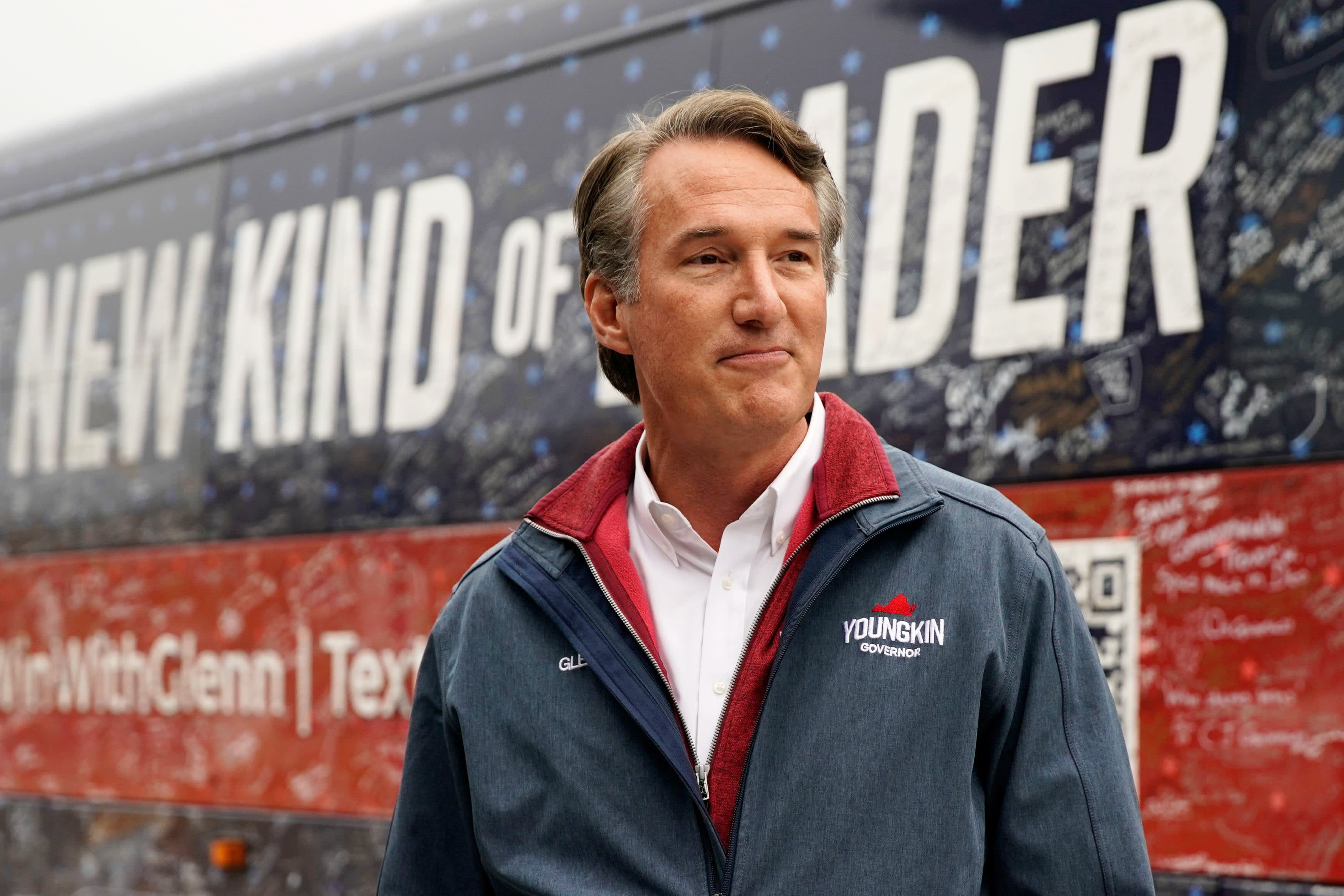
Virginia Republican gubernatorial nominee Glenn Youngkin talks to reporters outside a polling station on the Election Day, at Rocky Run Middle School in Chantilly, Virginia, U.S., November 2, 2021.
Elizabeth Frantz | Reuters
Glenn Youngkin, a wealthy Republican businessman, has won Virginia’s hotly contested gubernatorial election, defeating Democratic power player and former Gov. Terry McAuliffe in a race that drew national scrutiny, according to an NBC News projection.
Youngkin held a slight lead over McAuliffe in the early returns. Polls closed at 7 p.m. ET.
An estimated 95% of the expected vote is in for the Virginia governor race. Youngkin won about 51% of the votes while McAuliffe won 48.3%, according to NBC’s projections.
McAuliffe, 64, and Youngkin, 54, polled neck and neck in the weeks leading up to the commonwealth’s race to succeed Democratic Gov. Ralph Northam.
McAuliffe, a longtime close friend and advisor to former President Bill Clinton and former Secretary of State Hillary Clinton, aimed to make a comeback. He had served as governor from 2014 to 2018 for the commonwealth, which bans governors from seeking consecutive terms. He was also fighting to continue a Democratic winning streak in Virginia statewide races that began in 2012.
“We’ve had a great eight-year run here,” McAuliffe said during the first gubernatorial debate last month, discussing Democratic power in the state. “We have got, you look what’s happened in this state over the last eight years, open and welcoming everybody. Hundreds of thousands of new jobs. We moved forward, we made our state open and welcoming. We’re not going back.”
Youngkin, a political newcomer who made a fortune during his 25-year tenure at global investment firm Carlyle Group, saw his campaign exceed expectations, with his outsider status and extensive business background appealing to Virginians concerned about the state economy.
“I’m not a politician, and I certainly don’t have the 120 years of combined political baggage that my opponents have,” Youngkin said in a press release announcing his candidacy in January.
Virginia’s gubernatorial race was one of the first major statewide elections in the nation since President Joe Biden took office. It was also one of the last before Democrats gear up to defend their razor-thin majorities in the Senate and House of Representatives in next year’s midterm elections.
In the other gubernatorial race being decided Tuesday, New Jersey Democratic Gov. Phil Murphy sought reelection, challenged by Republican Jack Ciattarelli.
Some experts viewed the Virginia race as a referendum on the party in the White House and a bellwether of how that party will perform in the 2022 contests.
“Virginia has become a leading political indicator for the midterm elections because there are few statewide elections the year after a presidential contest,” said Stephen Farnsworth, a professor of political science at the University of Mary Washington in Virginia.
Both candidates scrounged for votes ahead of Election Day as tighter-than-expected polling meant that the race would hinge on turnout of their partisan bases.
Over the past two months, McAuliffe and Youngkin blanketed airways and digital spaces with campaign ads in which they took jabs at one another and often focused on national issues.
Advertising expenses made up about half of McAuliffe’s $44.4 million and Youngkin’s $42.2 million campaign war chests.
McAuliffe’s most expensive and most aired ads attacked his Republican opponent for his open opposition to abortion. Youngkin’s most aired and most pricey ads seized on McAuliffe’s objection to parental control in school curriculum.
But other issues rocketed to the forefront of the dead-heat race as well.
The two candidates, who both say they are fully vaccinated, maintained opposing positions on Covid-19 vaccine mandates. While McAuliffe would require teachers, students and health-care workers to get vaccinated, Youngkin opposed mandates and argued that they would force Americans who don’t want to get vaccinated out of their jobs.
The candidates also butted heads over former President Donald Trump.
Trump endorsed Youngkin and praised him for his business approach to politics. But Youngkin kept his distance from Trump and his allies, declining to rally alongside them and saying he accepted the results of the 2020 presidential election.
Meanwhile, McAuliffe took every opportunity to link his GOP opponent to the former president. Citing their overlapping stances on Covid-19 mandates and critical race theory, McAuliffe characterized Youngkin as a “Trump wannabe.”
However, McAuliffe had his fair share of trouble with his own party’s current president.
With Biden’s job approval ratings hitting low marks in Virginia, McAuliffe called the president’s unpopularity a challenge to his campaign.
“As you know, the president is unpopular today, unfortunately, here in Virginia, so we’ve got to plow through,” McAuliffe said at a virtual rally, Axios reported.




